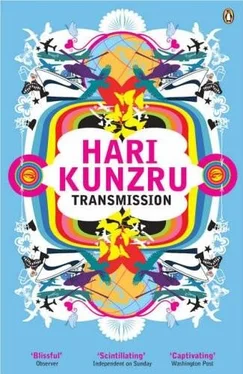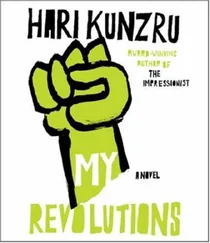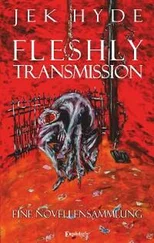Though it was common knowledge Qureishi was involved with Baby Aziz, Rajiv was unconcerned. Aziz himself had lived in the Gulf since the murder of a policeman in the mid 1980s, and as the city changed in the following years, with Hindu nationalist political gangs, the Pakistani secret service and old-fashioned financially motivated thugs all vying for power, he had made his presence felt indirectly, manipulating events from a distance. He was in some ways a mythical figure, not-quite-real, a bogeyman.
The next year Rajiv went out to Dubai as one of a group of stars playing ‘The Multimega Millennium Concert’, re-creating great screen moments for a stadium of excited fans. He was invited to a lavish after-party in one of the city’s new luxury hotels. There a rotund man with dead eyes and a smoker’s cough made a gesture of adaab and begged him to do him the favour of taking the microphone and leading the party-goers in a rendition of ‘Pull my trigger, Rant’, the wildly popular love song from his recent hit Big Gun Number One. Rajiv obliged, and Baby Aziz spent much of the evening slapping him on the back and introducing him to industry contacts. Later he provided personal entertainments of a kind even Rajiv, accustomed to pleasure, found exotic and surprising.
That year Rajiv Rana was hot-hot. He impersonated moody loners, maverick police inspectors, ordinary joes turned have-ago heroes and gym-toned loverboys in a series of hits that made him India’s favourite tough guy, the idol of the chai stall and the school-yard. He started an affair with the only woman who seemed worthy, a former Miss World turned movie heroine who had skin like butter and a figure which inspired in him unprecedented feelings of jealousy and possessiveness. He asked her to marry him, and when she turned him down he asked her again, arriving at her apartment late at night with a full wedding orchestra, causing irate neighbours to phone the police. He showered her with gifts (she was indifferent), covertly threatened her co-stars (she was angry), had her name tattooed on his left buttock (she laughed), then made a terrible mistake which drove her away and turned him into Baby Aziz’s puppet.
She was modelling bridal wear in a show at the Oberoi Hotel, a favour to the friend who had designed her Miss World gown. A group of young men started wolf-whistling when she came down the runway, their leader calling out that he loved her, asking when was coming the garam swimwear section. Rajiv was furious at the insult but equally concerned not to make a public scene. Having discovered the identity of the boy (the son of a wealthy tyre manufacturer), he allowed himself to be escorted from the building by his companions. Later, drunk and brooding, he made a series of phone calls, sounding off to anyone who would listen about disgraceful behaviour, lack of respect, reputation, punishment.
The next morning, in the midst of a blinding hangover, he took a call from a whispering male voice. ‘Baba asks. Baba is looked after,’ it said, then hung up. That evening the television news reported that Rahul Subramanian, heir to the S.B. Radials fortune, had been found burned to death in his car in a slum area of the city.
Rajiv went into his bathroom and vomited into his hand-carved marble sink.
He did not leave the house for several days, during which time rumours about Subramanian’s death flew around Mumbai society, rumours which thankfully did not touch him. He went to see Qureishi, who claimed not to know what he was talking about, but suggested it might be helpful if he took a holiday, at least until he felt a little calmer. ‘You need relaxation,’ said the bookmaker. ‘You are our hero. We want what’s best for you.’
The next few months were terrible. He considered confessing. But to whom? And to what? He hadn’t wanted the boy killed. He hadn’t asked anybody to do anything specific. At night he dreamed of flames and melting faces. He could not concentrate on work, walking out of Abs, a project produced by the team responsible for his greatest box-office successes. Miss World, bored by his increasingly erratic behaviour, was seen out on the town with a rising young model-turned-actor. When she stopped returning his calls, Rajiv arrived on the set of her latest romantic comedy and caused a scene. The movie magazines had a field day. Miss World gave Stardust an ‘everything is over between Rajiv and Me’ exclusive. Then Baby Aziz started calling in favours.
It began gradually. Rajiv made personal appearances at functions organized by Aziz’s friends. He signed on for Look Out… Love Alert! A box-office bomb that it was ‘suggested’ would be useful for his career. If he questioned things or got angry, a call would come from the Gulf. ‘When we think of you,’ the wheezing voice would croon, ‘our hearts are filled with emotion. We would never want to reveal anything harmful to your public self.’
The demands got heavier. He lent money without real hope of return. He agreed to store some crates (of machine parts, they told him) at one of his country properties. People in the industry began to whisper. When he complained that the rumours were damaging his image, Aziz was unsympathetic.
‘People always talk,’ he said. ‘You must learn to ignore it.’
Rajiv Rana, accustomed to giving orders, got used to taking them. He had little choice about the restaurants and office parks he opened, the products he endorsed, the tinpot little weddings at which he had to sing. Aziz’s people were renting him out to the highest bidder like any other asset, a car or a woman. He endured the humiliation quietly until they told him to turn down Heroes of Kargil. It was too much. A wave of patriotic fervour was sweeping the country. The director was talented. The songs were great. There was even a completed script. The film was a sure-fire hit.
He refused.
When Aziz called, he told him he didn’t understand the movie business. ‘I wouldn’t lecture you on how to run your affairs, so leave choice of roles to me.’ Aziz said he thought the treatment was biased. There was Shiv Sena money in the picture. ‘Bhai,’ he whispered, ‘you wouldn’t wish to inflame communal passions at such a time.’ Rajiv ( Filmfare headline: I’m not political, I’m an entertainer ) hung up on him.
The next day Karim, his driver, was delivered to his front door in a sack. He was alive, but his ears and nose had been cut off. Rajiv had several lakhs of rupees couriered to the man’s hysterical wife, and when Aziz called again he listened, trying to hold the receiver steady in his shaking hand. The message was blunt. ‘You will not do this Kargil rubbish. Instead you will make yourself available for a new film. To be called Tender Tough. Like me. You will clear all dates completely. As a favour I will allow you to take one-third of your standard fee. This, you understand, is my gift, my friendship token. Do not worry yourself about artistic standards. Tender Tough will be a hit movie. You will be given best director, large budget. You will even have choice of co-star. Now you may thank me.’
Rajiv mumbled something and left the house on a three-day bender, after which he had to pay money to a bar owner, a hotelier and a model whose facial bruises would prevent her from working for several weeks. A version of it made the gossip columns: Has Raju become Big Fist Number One?
He turned down Kargil and saw the role go to his rival Salman Khan. His image was trashed. Having been a hero for so long, he had developed the habit of referring to himself in the third person, shortening himself to his initials, a fan’s affectionate nickname. But was ‘ R. R.’ now to be the villain? Slumped in front of the giant plasma screen at his Juhu bungalow, he found relief in a sequence from High School Hearts, a film he had ignored when it was released the previous year. As the heroine learned her boyfriend had been killed in a traffic accident, her stricken face filled the frame. It seemed to radiate vulnerability, trust, a need to be protected. He groped for the remote, replaying the sequence again and again. The girl’s face turning, her eyes sparkling with glycerine-drop tears… He found himself in tears too, crying for innocence and purity, everything that had vanished from his own life. Everything this girl would surely be able to replace.
Читать дальше











